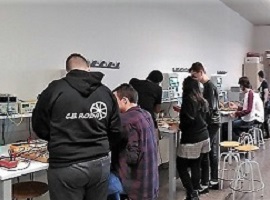Electricity Laboratories
Index of the laboratories
- Laboratorio de Sistemas Eléctricos
- Electrical Installations Laboratory
- Electrical Machines Laboratory
Electrical Systems Laboratory
Location
A4.31
Description
A facility shared by all the School's bachelor's degrees. It has nine workspaces (maximum capacity 16 students). In practicals, students are expected to get to know the basics of and learn to use the most common laboratory instruments and to start learning techniques for data acquisition and analysis and the assembly, measurement, analysis, modelling and simulation of circuits and electrical devices (at a basic level in the subject Electrical Systems and at a more advanced level in the subject Circuits and Signals).
Subjects
Equipment
Tektronix TBS1052B-EDU digital oscilloscope, ISO-TECH IPS-3303 continuous triple power supply, single-phase AC power source, ISO-TECH GFG-8255A function generator, MERA analogue wattmeter , ISO-TECH IDM-73 digital multimeter, AD INSTRUMENTS AD9805A digital multimeter, AD INSTRUMENTS AD71B digital multimeter, AC current probe for the CHAUVIN ARNOUX MINI 05 multimeter, DC/AC current probe for PICO TA018 oscilloscope, computer.
Perhaps the most noteworthy of the instruments is the Tektronix TBS1052B-EDU digital oscilloscope. It is a model adapted for educational purposes. The instrument shows on screen the tutorial that will guide the student during the practical. Also worth mentioning is the AD INSTRUMENTS AD6830 network and harmonics analyser, a device widely used in engineering for assessing the quality of electricity supply and consumption.




Electrical Installations Laboratory
Location
AS1.3
Description
Practicals held in this laboratory demonstrate several aspects of high- and low-voltage electrical installations and the associated protections.
Subjects
Equipment
Material for assembling low-voltage distribution electrical panels; wired and programmed industrial automatisms (programmable automata); equipment for testing the behaviour of protections according to the neutral system; a user transformer (high and low voltage); a safety and rescue kit; equipment for testing electrical system protections and electrical power plant protections; measuring equipment (network analysers, etc.).




Electrical Machines Laboratory
Location
AS1.4
Description
This facility is used mainly for the electricity specialisation, although students on the energy engineering bachelor's degree also use it. In practicals, students are expected to become familiar with the fundamentals of electrical machines and learn to use the most common laboratory test instruments and techniques in the field of electrical machines and drives.
Subjects
Equipment
In the Laboratory, tests can be carried out with different types of electrical machines. Its equipment includes:
- Input transformer of 200 kVA, 400 V / 400 V / 230 V.
- Sets of machines with benches with nominal power ratings of 1.5 kW, 7.5 kW and 22 kW.
- Groups formed by alternator + asynchronous machine, alternator + direct current machine, asynchronous machine + direct current machine. Single-phase motor + direct current machine, asynchronous rotor winding motor + direct current machine. Synchronous reluctance motors.
Other equipment: network analysers, ZIMMER four-channel wattmeter with torque and speed measurement, magnetic loss meter, Epstein frame, torque meter up to 1 Nm and 70000 rpm, velocity meters, thermographic camera, torque and velocity meter up to 150 Nm and 1500 rpm, variable-frequency drives up to 400 Hz and 30 kVA, four-quadrant controlled rectifiers up to 440 V and 90 A, induction regulator 40 ... 450 V, 100 A, synchronisation column of network alternator, variable capacitor benches, variable rheostats up to 100 A, 15-kVA adjustable three-phase coil.




Share: